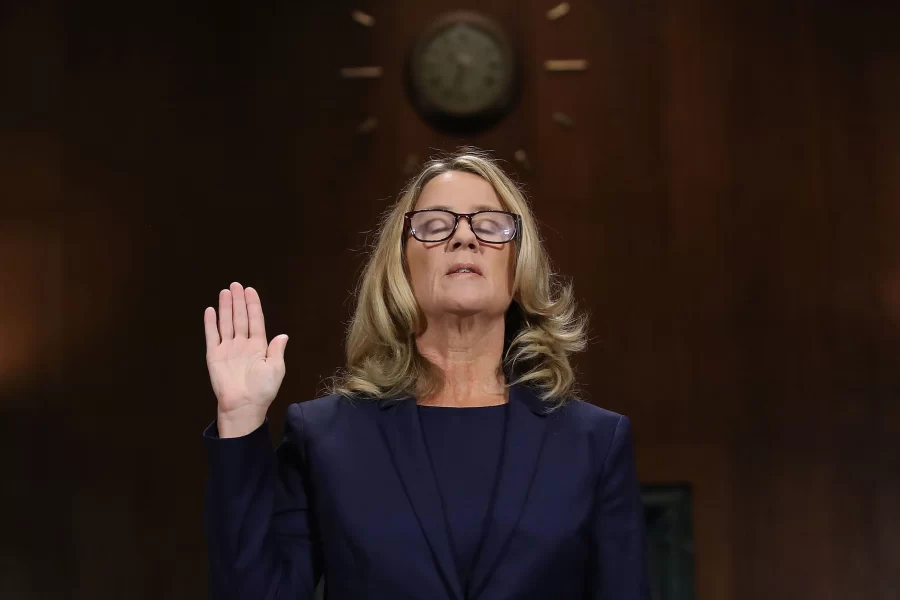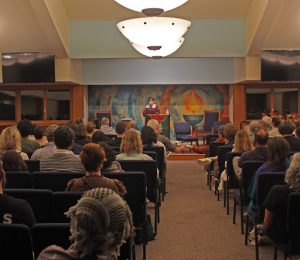Society must place trust in survivors
The unfair vilification of women prevents them from speaking out
Christine Blasey Ford, who accused then-nominee Brett Kavanaugh of sexual assault, testifies before the Senate Judiciary Committee.
April 20, 2022
n 2017, Tarana Burke’s “#MeToo” movement garnered international attention. With upwards of 19 million tweets containing the hashtag within one year of its conception, the movement put sexual assault and harassment at the forefront of conversation in the United States and beyond. However, as women gained visibility and sought comfort in the comradery provided by the movement, the misogyny deeply entrenched within society persisted with the all-too-familiar vilification of women in the media.
The demonization of outspoken women did not originate with the “#MeToo” movement, nor did it end there. Yet, it became particularly poignant as woman after woman was struck down by doubt and ridicule. Many supporters, activists and survivors alike had a substantial fraction of social media users and Americans devoted their efforts to discrediting victims for their claims. Rather than approach this issue with sensitivity and compassion, they attempted to craft an image of these women as evil, morally-corrupt individuals who were exploiting men to advance their self-interests.
With each accusation that arose, suspicion circulated surrounding the integrity of both the claim and the victim. Suddenly, women voicing their past traumas were politically-motivated, regretful of their own choices and above all else — liars. This slander was hurled viciously at all of these women but was most notably and disproportionately directed towards those who brought accusations forth against figures in power.
Dr. Christine Blasey Ford, a professor of psychology at Palo Alto University and research psychologist at the Stanford University School of Medicine, came forward after publishing an anonymous letter in the summer of 2018 accusing then-Supreme Court nominee Brett Kavanaugh of sexual assault. Ford voiced her reluctance to reveal her identity out of fear of retribution, as coming forward is difficult regardless of the backlash.
Along with the support that Ford gained came a slew of criticism, mostly from those in favor of Kavanaugh’s appointment. These people questioned her incentives and believed her to be a fraudulent pawn for the Democratic party, they delved into her background in a desperate search for mistakes or moral failings. While disheartening, this ideology has remained consistent across decades as a method of dissuading women from speaking out against perpetrators and deterring them from seeking justice.
Although social media has made this behavior more readily visible, its advent did not coincide with the beginnings of the “#MeToo” movement. As prominent actors, producers, politicians and others were slowly removed from the limelight as accusations from previous years mounted against them, others remained unnoticed, formerly dismissed at the expense of survivors in efforts to pardon abusers.
An infamous case paralleling the disdain brandished towards Ford occurred 20 years prior, when the scandalous affair between then-president Bill Clinton and White House intern Monica Lewinsky erupted in the public eye. Despite the evident abuse of power exercised by Clinton, Lewinsky was the subject of harassment and beratement, and the subsequent public vilification of her character. Clinton, conversely, faced considerably more political chastisement than moral degradation and was allowed to repair his blemished image. Lewinsky was never graced with this opportunity.
It is unnerving that it is more acceptable to disparage victims and condemn their character than it is to hold assailants accountable for their actions. The “#MeToo” movement has made unprecedented strides in combating societal predispositions regarding victims, yet the extent of this problem remains untouched. In order to move forward, as lawmakers, as a country and as empathetic, understanding individuals, it is essential to deconstruct this notion of survivors as villains. To comprehensively address this issue, there must be a foundation of respect and trust in those who have historically been marginalized by society when communicating their truth. Ultimately, by prioritizing survivors, the vilification of women can be dismantled, and victims can become empowered to heal in an accepting world.













